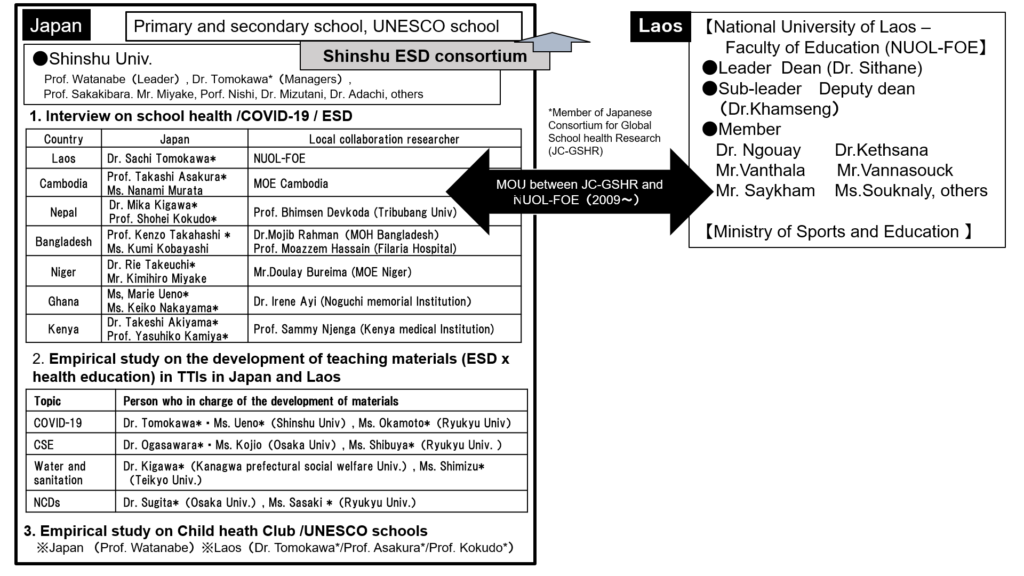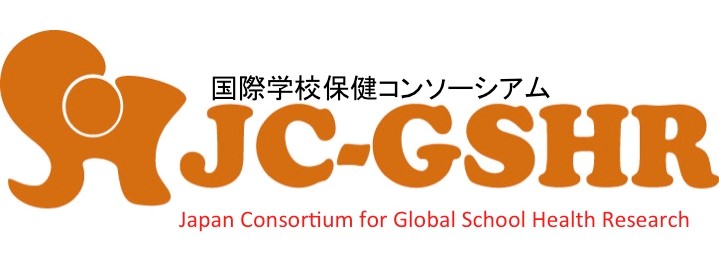Contents
- 1 Empirical research on development potential and challenges of Japanese-style school health contributing to the realization of SDGs
Empirical research on development potential and challenges of Japanese-style school health contributing to the realization of SDGs
1. Outline of the research
This research aims to examine empirically the developmental potential and challenges of Japanese-style school health in contributing to addressing issues such as the realization of SDGs and COVID-19 countermeasures. It includes interview surveys about Japan’s ODA in school health sector and progress of ESD dissemination in developing countries so as to clarify challenges and developmental potential of Japanese-style school health. In addition, it plans to conduct other activities, such as development of teaching materials regarding SDGs and COVID-19 countermeasures, teacher trainings, health checkup activity with Child Health Club (CHC), and evaluation of achievement and challenges of these activities.
2. Purpose
The purpose of the research is to examine empirically the possibilities and challenges of the contribution of Japanese-style school health to specific issues including the SDGs and COVID-19 countermeasures. For this purpose, the following points are to be clarified and/or to be achieved:
(1) Current situations of school health-related services supported by past Japan’s ODA in developing countries, and factors related to the situation (ex. promoting and obstructive factors for the services),
(2) Dissemination status of ESD in developing countries and challenges in the dissemination in developing countries,
(3) Development of teaching materials on SDGs and COVID-19 countermeasures in Teacher Training Institutions (TTIs) in Japan and Laos, and evaluation of teacher training with developed materials by implementing trial trainings
(4) Evaluation of achievements and challenges in the promotion of ESD through UNESCO schools in Japan and health checkup activities with approaches including Child Health Club (CHC) in Laos.
3. Target country
Lao People’s Democratic Republic (Lao P.D.R / Laos), Kingdom of Cambodia (Cambodia), Federal Democratic Republic of Nepal (Nepal), People’s Republic of Bangladesh (Bangladesh), Republic of Niger (Niger), Republic of Ghana (Ghana), and Republic of Kenya (Kenya)
4. Implementation structure

5. Progress in the fiscal year 2021
Followings are the principal activities implemented in the fiscal year 2021:
- Online meetings with local collaborators in the target countries several times;
- Collection of information about Japan’s ODA in school health sector in each target country and analysis of the collected information;
- Collection of administrative documents (ex. policy, strategy, implementation guideline, activity plan, notice, teacher’s manual) on school health, COVID-19 countermeasures in school and ESD in each target country and analysis of the collected documents;
- Preparation for implementation of surveys, such as selection of interviewees, development of interview guides and ethics review procedures.
6. Future plan
We have been conducting online lesson studies with students in the undergraduate and graduate courses, making use of developed teaching materials, in the Faculty of Education of the Shinshu University since the beginning of January in 2022. Online lesson study enables different people to participate in the lesson study, and in fact, professors and graduate students in various areas of expertise, such as anthropology, public health and gender, have participated in the lesson study from the Oosaka University and the University of the Ryukyus, so as to develop discussions from diversified perspectives. In addition, participations of in-service teachers and practitioners who have rich experience in developing countries have also enhanced discussions about Japanese-style health education in the lesson study. In the late January, we started a discuss with local collaborators in Laos to develop the teaching materials for teachers in developing countries so that those materials would be better adapted to the Laotian context.
7. Outcomes
1) Report in the symposium of the Japan Association for International Health in 2020-2021
We made a report on school health in Japan, features of Japan’s ODA in school health sector, and potential and challenges in applying Japanese-style school health to developing countries, based on the six articles shown in the list below:
List of 6 articles published in 2020-2021 (Pediatrics International)
Factors Enabling Systematized National School Health Services in Japan. Pediatrics International, 2021, Shizume, E., Tomokawa, S., Miyake, K., Asakura, T. DOI: 10.1111/ped.14864
Sustainable human resource training system for promoting school health in Japan. Pediatrics International, 2020, 62(8): 891-898, Tomokawa, S., Miyake, K., Asakura, T. DOI:10.1111/ped.14292
Lesson learned from health education in Japanese schools. Pediatrics International, 2021, 63(6): 619-630, Tomokawa, S., Shirakawa, Y., Miyake, K. et al. DOI: 10.1111/ped.14637
Health screening system to ensure children’s health and development in Japan. Pediatrics International, 2021, 63(8): 869-879, Tomokawa, S., Miyake, K., Takahashi, K. et al. DOI: 10.1111/ped.14733
Participation of children in school health in Japan. Pediatrics International, 2020, 62(12): 1332-1338, Tomokawa, S., Miyake, K., Takeuchi, R., Kokudo, S., Asakura, T. DOI: 10.1111/ped.14347
Lessons on health promotion from Japanese early childhood development. Pediatrics International, 2020, 63(1): 22-36, Miyake, K., Tomokawa, S., Asakura, T. DOI:10.1111/ped.14400
Empirical study to develop teaching materials (ESD & health education) in TTIs in Japan and Laos
In this research project, the Shinshu University has led the empirical study to develop teaching materials (ESD & health education), principally in TTIs in Japan and Laos. In the fiscal year 2021, research team in the Japan Consortium for Global School Health and Research (JC-GSHR)developed teaching materials, materials for teacher training and teaching plans for teachers in Japan and developing countries on the following four issues that contribute to realizing the SDGs and COVID-19 control: COVID-19, comprehensive sexuality education, water and sanitation, and non-communicable diseases. In addition, we conducted lesson study in undergraduate and graduate courses in Shinshu University.
3) Empirical study on activities of Child Health Club (CHC) and UNESCO schools
We have conducted preliminary works to organize an award for ESD activities (ex. those of health, safety and/or environment) in school in Japan
